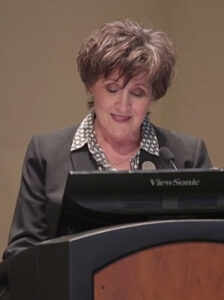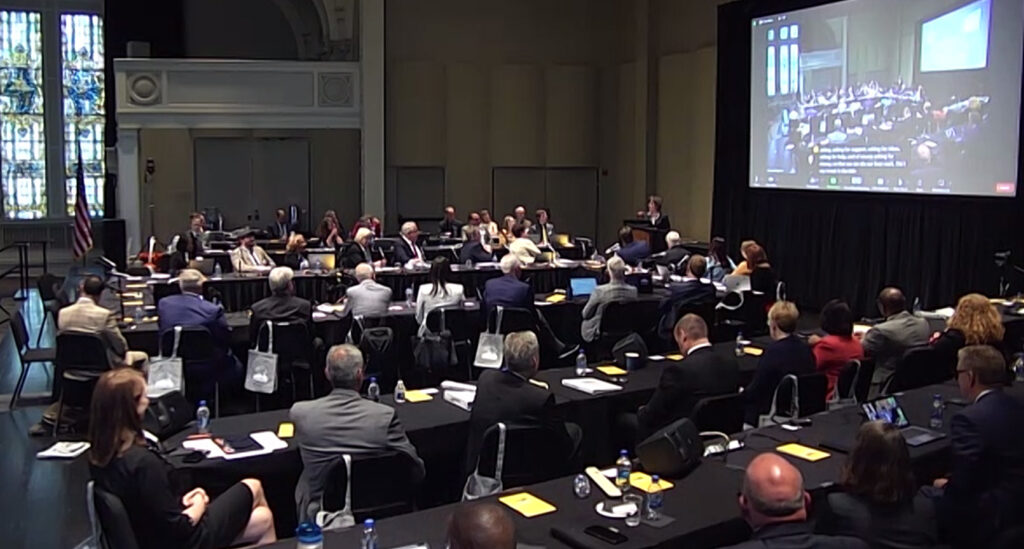
UW-Milwaukee hosts the UW System Board of Regents June 2023 meeting in the Helen Bader Concert Hall.
MILWAUKEE – University of Wisconsin System President Jay Rothman reiterated the need for state investment in Wisconsin’s public higher education system at today’s Board of Regents meeting.
“Our 13 public universities are a unique asset that can help Wisconsin win the war for talent,” Rothman said. “And winning that war requires investment not only in our K-12 and technical college system, but also in the schools that comprise the University of Wisconsin System.
“You cannot have the kind of healthy economy we all want without supporting a strong university system,” he continued. “But to be brutally candid, that is not what Wisconsin is doing right now.”
Rothman pointed to a recent State Higher Education Executive Officers Association (SHEEO) report that found Wisconsin’s financial support for its public four-year university system now ranks 42nd out of the nation’s 50 states.
He also noted that state general support for UW System universities is lower today than 10 years ago on an inflation-adjusted basis.
“Investments made by the state in the UW System as part of the budget process – or the investments not made – will define the future of our state,” Rothman said.
Rothman told Regents that he also appreciates the need for the UW System to look beyond revenue lines.
“I am absolutely committed to ensuring that UW System takes a hard look at all of our expenses, ensuring that we are responsible stewards of taxpayer and tuition dollars. All options are and must be on the table. However, and this is a critical point, no organization can cut its way to success. It is not possible.”
The UW System’s biennial operating budget request is expected to be considered in the coming weeks.
System President’s Report
In addition to calling for increased state support for the UW System, President Rothman told Regents he did appreciate recent action taken by the legislature’s budget-writing committee to approve several facilities in the capital budget request, including projects at UW-Stout, UW-Stevens Point, UW Oshkosh, and UW-Eau Claire. “However, for Wisconsin to compete and prosper, we must invest in high-demand programs at all our universities,” he said.
Rothman singled out UW-Madison’s engineering building as UW System’s top priority. The project was not among those approved. “Investing in this facility will help address a crucial workforce shortage in the state as well as enhance the world-class research that draws talent into our state and drives economic vibrancy. We will continue to champion this vital project,” he said.
In his report to the Board, Rothman also took time out to highlight several notable accomplishments in the UW System family, including the recent presentation of more than 23,000 new degrees. He said it’s worth noting that one in three UW freshmen overall are first-generation college students. “Think about that, and how the trajectory of their lives – and their families’ lives – may be altered,” he said. “Think also about the potential difference this could make for Wisconsin overall.”
Rothman also congratulated UW-River Falls for a string of recent victories in national agriculture competitions.
Finally, he congratulated Alex Roe, Senior Associate Vice President for Capital Planning & Budget, for earning the U.S. Department of Education Green Ribbon Schools Director’s Award for 2023 for making the advancement of sustainability a priority at UW universities.
He quoted from the letter announcing the award: “We are grateful to have you as a leader in Wisconsin and an example to higher education authorities across the country.”
UW-Milwaukee is “Providing Solutions Through Partnerships”
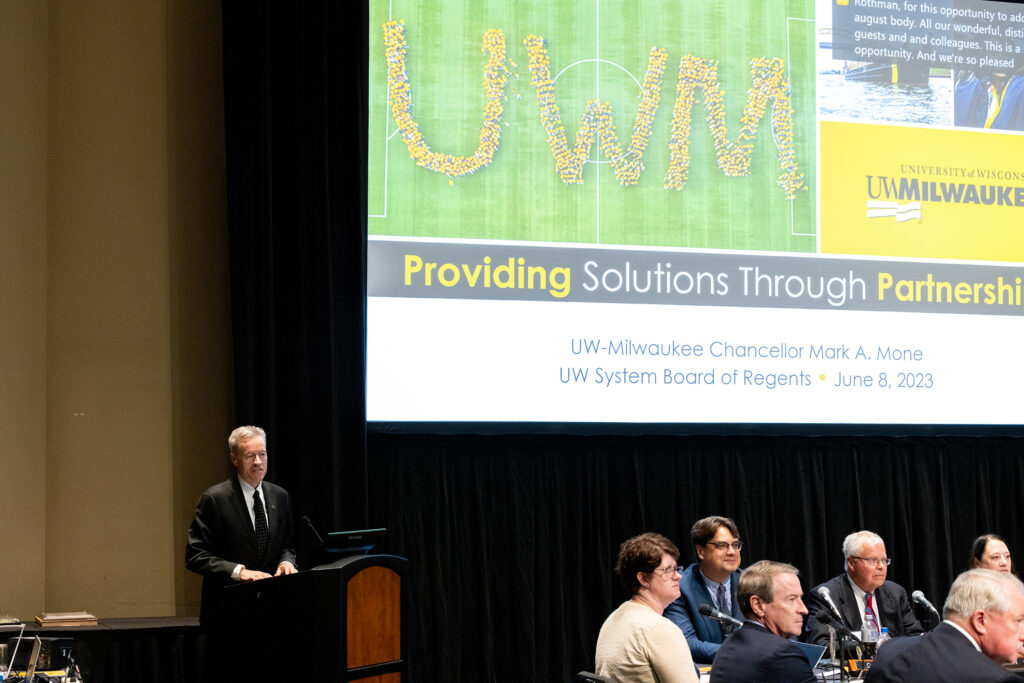
Chancellor Mone’s presentation to the Board of Regents: “Providing Solutions Through Partnerships” (Photo by UWM)
UW-Milwaukee Chancellor Mark Mone shared how his university’s community partnerships are producing powerful results in the host campus presentation, “Providing Solutions Through Partnerships.” Key goals of these partnerships include addressing the state’s workforce shortage and boosting the economy while closing the gaps in educational attainment.
Mone hosted a panel of representatives from five area organizations with which UWM is engaged: M-Cubed, the Higher Education Regional Alliance (HERA), Moonshot for Equity, the Hispanic Collaborative and the Metropolitan Milwaukee Association of Commerce. These groups collaborate on providing resources and conducting research into best practices that remove obstacles and close the racial achievement gaps in education at various levels.
Regents heard from leaders of the organizations about how they’re better preparing students of color for higher education, improving college retention of students, and diversifying the workforce. Doing so not only improves the economic prospects of students, but also helps fuel the talent pipeline that Wisconsin employers rely upon.
Mone highlighted the need to produce enough graduates to fill the 100,000-plus jobs that will require a college degree in the coming years. Part of the solution, he said, is reducing the graduation rate gap between students who are white and students who are Black or Hispanic.
Mone added that accomplishing those goals will not only lift people out of poverty, but also dramatically extend their life expectancies, which he called a “moral imperative.” He compared data between residents in Milwaukee’s low-income 53206 zip code and those in the 53217 zip code, which is just 8 miles away and has a low poverty rate. Residents of 53217 have a median household income of $97,960, and 76.1% of them have a bachelor’s degree or higher, with an average life expectancy of 83.2 years. Residents of 53206 have a median household income of $22,468, and 21.6% of them have a bachelor’s degree or higher, with an average life expectancy of 71.3 years.
“Those determinants of health are working against these populations without educational attainment,” Mone said. “So what are we doing about this? There’s so much more muscle, there’s so much more firepower, when we work together. These partnerships are creating knowledge, resolving problems, securing federal funding – all necessary to be able to address inequities at scale.”
Board President’s Report
Regent President Karen Walsh provided an update on the ongoing search for the next chancellor at UW-Parkside. With the deadline for applications closing last week, the search and screen committee (chaired by Regent Kyle Weatherly) will now begin review of applicants and plan to hold semifinalist interviews later this summer. It’s expected a new chancellor will be named by early Fall 2023.
Walsh also told Regents that long-time collaborations between UW-Milwaukee and WEC Group (WE Energies) were recognized Wednesday with the presentation of the most recent Regents Business Partnership Awards.
WE Energies has partnered with UWM for nearly half a century and is the university’s top corporate donor with than $11.4 million in contributions. There are currently 234 UWM graduates working at the company, Walsh said. WE Energies is also a major supporter of the Moon Shot for Equity initiative, which helps remove barriers to students completing college degrees.
Walsh noted that Regent Business Partnership Awards were presented to UW-Eau Claire and Mayo Clinic Health System in Northwest Wisconsin in April. Since a research collaboration agreement was signed in 2017, UW-Eau Claire students, faculty, and staff have worked on more than 40 collaborative projects with Mayo’s physicians and scientists. Students have also had the invaluable opportunity to take part in clinical rotations and observation experiences at Mayo Clinic Health System.
Last month, Regent Business Partnership Awards were presented to UW-Platteville and Neenah-based Plexus Corp., a global leader in complex product design, supply chain, manufacturing and sustaining services. The company is a frequent senior design partner in mechanical engineering and electrical engineering student projects at UW-Platteville. Dozens of UWP students currently work at Plexus.
Regents welcome new colleagues
Regents welcomed several new colleagues recently appointed by Gov. Tony Evers.
Jim Kreuser, a long-time Kenosha County executive (2008-2022) and previous member of the Wisconsin State Assembly (1993-2008), is appointed to a seven-year term. A first-generation college student, he earned both a B.A. and master’s degree from UW-Parkside.
“It means a lot to be on the Board of Regents, to serve the state, and to serve with such a distinguished group,” Kreuser said. He also thanked UW-Parkside, where he was given “the opportunity to learn and find my passion and live it every day.”
Evan Brenkus, a student at UW-Green Bay majoring in First Nations Studies with a minor in Mathematics, will serve as one of two student Regents on the Board.
“I would never have expected anything like this to happen in my lifetime. I’m incredibly grateful,” said Brenkus, who also works with the Oneida Nation’s language immersion school.
Regent Mark Tyler, who has twice previously served as the WTCS representative on the Board (2011-13 and 2015-19), will again fill that role until the WTCS holds its next elections later this summer. Regent Rodney Pasch previously held the position.
Regent Joan Prince, first appointed to the Board last February to fill the remainder of former Regent Tracey Klein’s term, has been re-appointed to serve a full seven-year term.
The Board also officially welcomed UW-Platteville’s 15th Chancellor, Tammy Evetovich. She had served as interim chancellor since June of 2022. “I am humbled to lead the university. We have so many great people there,” she said.
Board recognizes service to UW
The Regents formally recognized the service of Regent Emeritus Scott Beightol, whose term on the Board ended in May, with a resolution of appreciation.
Noting his appreciation for the opportunity to serve, Beightol called the collegial manner in which Board members worked together despite often different perspectives very unique and urged them to “honor it, foster it, and protect it.”
Looking ahead, he said Regents, System leadership, and Chancellors need to act with more urgency. “Too many campuses are in financial distress,” he said. “We need to quickly address our revenue streams, add enrollment, and look at … increasing partnerships with business and industry who want access to our faculty and students.”
Beightol also called for enhanced support for both of the System’s R-1 universities. “Wisconsin needs and deserves two quality R-1s,” he said. He urged Regents to continue to advocate for bonding authority and support for the Wisconsin Tuition Promise.
Finally, he told Regents to “own what is yours,” pointing to curriculum, staffing, free speech, research and educational missions, and the search for truth. “Let’s ensure access to public education and all that it unlocks for anyone in Wisconsin that wants the opportunity,” Beightol said.
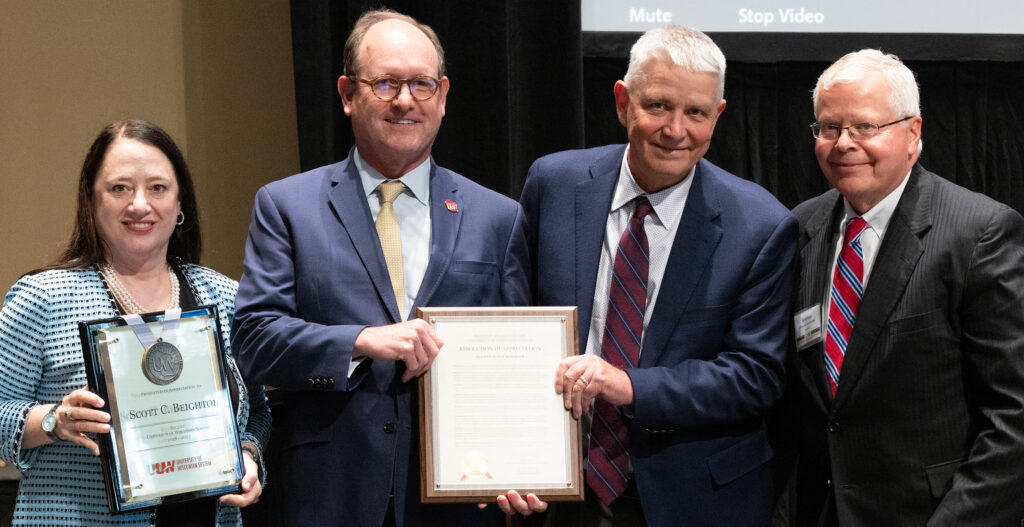
Regent Scott Beightol (second from left) accepts his resolution of appreciation for serving on the Board. Also pictured: (from left) Regent President Karen Walsh, Regent Bob Atwell, and UW System President Jay Rothman. (Photo by UWM)
Regents also saluted UW-Parkside Chancellor Debbie Ford, who is leaving the UW System after 14 years to become chancellor of Indiana University Southeast. Regents recently voted to confer on her Chancellor Emerita status.
“It’s not work when you love what you do and you get to see learning in action every day,” Ford said. “And it’s easy when you place students at the center of your decision-making.”
She urged colleagues to be loud and proud supporters of UW; to always be asking for ideas, support, and money; and to “embrace learning as this is why we have all chosen to work at a university.” Ford also reminded them to take time to listen and see all of our students and members of the learning community. “Too often we do not know the impact of those connections,” she said.
Ford said that UW-Parkside will always hold a special place in her heart. “I had the honor of leading a university that transforms lives,” she said. “The most repeated phrase I would hear from alumni, is ‘If not for Parkside….’”
Finally, she offered a few words of advice: “Remember, remain calm, absorb chaos, and give back hope. This is what we must do as leaders today,” she said.
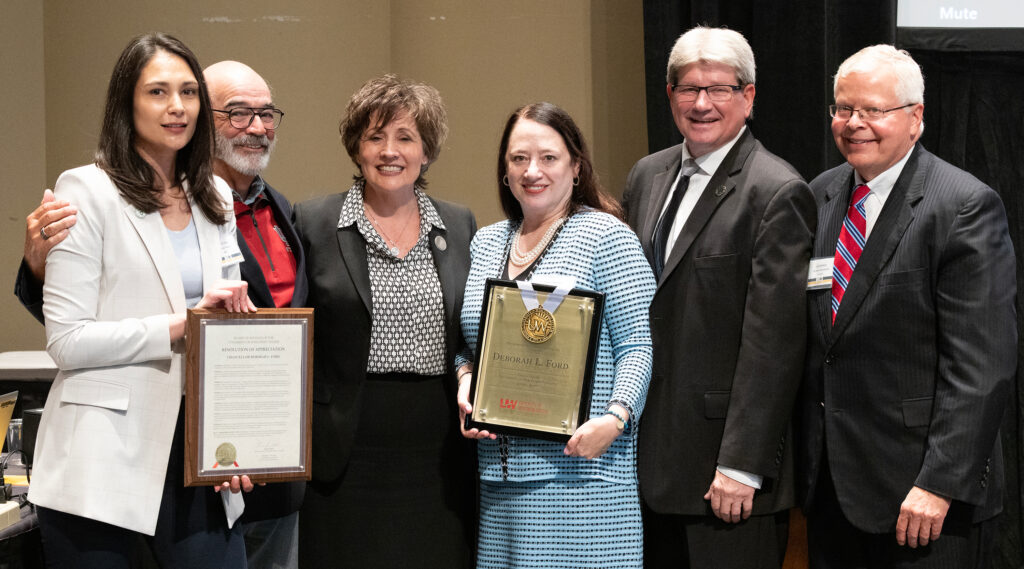
Chancellor Ford (center left) accepts her resolution of appreciation. Also pictured (from left): Regent Jennifer Staton, Regent Emeritus Mike Falbo, Regent President Karen Walsh, Regent Jim Kreuser, and UW System President Jay Rothman. (Photo by UWM)
The Board also presented a resolution of appreciation for former State Senator Alberta Darling’s service to the UW System. Darling was not present.
Education Committee
UW System Vice President Johannes Britz facilitated a discussion with provosts, UW System staff, and campus leaders reviewing the collective work of the Office of Academic and Student Affairs (OASA) aligned with the UW System Strategic Plan during the 2022-23 year. The discussion shared: (1) updates, progress, and other strategic actions taken on issues presented to the Education Committee and initiatives supported by the OASA during the year; (2) the context and overarching leadership framework for these initiatives; and (3) a look ahead to the 2023-24 year and identify goals and priorities to further implement the UW System Strategic Plan. A future Education Committee discussion will explore plan implementation at the campus level.
In other business, the Education Committee:
- Approved the Annual Request for Funding from the Vilas Trust Fund for UW-Madison and UW-Milwaukee. The annual request, which this year totaled almost $8 million, will support scholarships, fellowships, professorships, and special programs in Arts and Humanities, Social Sciences, Biological Sciences, Physical Sciences, and Music;
- Approved UW-Eau Claire’s request for a Master of Public Health in Public Health. The interdisciplinary, online graduate degree may be completed in two years for students enrolled full-time. It will elevate two undergraduate majors, both public health and environmental public health, and is initially supported by a Workforce Innovation Grant from the Wisconsin Economic Development Corporation to address a variety of workforce challenges in northwest Wisconsin;
- Approved UW-Madison’s request for a Master of Science in Business: Accounting and Business Analysis. Analysis from the Marketing and Strategic Communications Office in the School of Business reveals stable growth in market demand for graduates possessing the skills gained in this program. With 393,000 job postings requiring a Certified Public Accountant (CPA), the majority require or prefer the applicant to hold a master’s degree;
- Approved UW-Madison’s request for a Master of Business Administration in Business: Executive. This proposal represents the school’s plan, based on extensive market research, to establish a new Executive MBA degree program that will reflect current student demand and market influences. Key enhancements for the new degree include: A hybrid format, with 50% of the content being delivered online; focused content on leadership, strategy, and decision making; accelerated timeline with the 32-credit program to be completed in 18 months; and extended non-curricular activities to include experiential learning, career coaching, and presentation coaching;
- Approved UW-Madison’s request for a Bachelor of Science in Animal and Veterinary Biosciences. This program will provide students with a foundation in animal and veterinary concepts and applied science, responding to the needs of the current student population, and allowing greater access for transfer students and students who redirect their focus of study during their undergraduate career. The program has been redesigned to better meet the needs of students by providing more distinct academic and career pathways;
- Approved UW-Milwaukee’s request for a Master of Science in Rehabilitation Science and Technology. The MS-RST will prepare students for an evolving job market within the rehabilitation, special education related services, disability related services, occupational health, safety, and performance domains. After completing core and foundation courses, students will specialize in one of four areas: (a) Assistive Technology and Accessible Design; (b) Human Factors Innovations; (c) Intervention and Consultation in Performance Psychology; and (d) Rehabilitation Sciences;
- Approved UW-Stout’s request for a Bachelor of Science in Automation Leadership. The program partners with the Wisconsin Technical College System (WTCS) to serve individuals with an associate of applied science degree who seek career advancement through a combination of online and local instruction. It will also partner with the Smart Automation Certification Alliance (SACA) whose goal is to “develop and deploy modular Industry 4.0 certifications.” Demand for the program is evidenced by critical workforce needs outlined in letters of support from industry partners and the projected 8% growth in management occupations over the next decade;
- Approved the 2023 Report on Faculty Promotions, Tenure Designations, and Other Changes of Status. Regent action is the final step in the rigorous tenure process, and the Regents congratulated the more than 400 faculty members who have been newly tenured, promoted, and hired with tenure;
- Heard a UW-Milwaukee presentation on “Data-Driven Collaborations for Student Success.” Data analytics are being used to drive decisions on directing students to a one-year academic bridge program, identify students who could benefit from enhanced academic support, and other efforts to tailor the academic experience to individual students. Data-driven strategies underpin the transformative and comprehensive cross-institutional Moon Shot for Equity initiative with UWM’s partners at UW-Parkside, Milwaukee Area Technical College, and Carthage College to eliminate the equity gap in student success.
Business and Finance Committee
The Business and Finance Committee approved a five-year, $11.6 million extension of UW System’s agreement with EAB Global for its Navigate system of services and software that provides analytics, student success coordination and communication management. Navigate is currently used by the 12 UW institutions other than UW-Madison, and has proven to successfully support advising, enrollment management, and transfer functions on campuses, as well as to provide strategic data to administrators and faculty.
In other business, the Business and Finance Committee:
- Heard a presentation from Vice Chancellor Robin Van Harpen and Associate Vice Chancellor Drew Knab detailing how UW-Milwaukee’s financial planning strategies are aimed at supporting their dual mission of both access and research. In addition to making targeted investments that promote enrollment and student success, UWM continues to pursue revenue growth through enhanced online programming, partnerships, and philanthropic opportunities;
- Approved UW-Milwaukee’s agreement that extends its participation in the Northwestern Mutual Data Science Institute for an additional five years, following its establishment in 2018. With partners including Northwestern Mutual and Marquette University, the goal of the Institute is to build a regional technology ecosystem through research, business, and talent development. While the nonprofit Northwestern Mutual Foundation will again provide over $5 million in support to UWM, the potential for an additional $1.25 million directly from the company for sponsored research projects necessitates the Board’s approval of this agreement;
- Approved UW-Milwaukee’s agreement with Guild Education, a public benefit company that works with an exclusive network of employers that offer education benefits, allowing UWM to engage those learners to provide an array of degree and certificate programs. The agreement anticipates revenues of $1.9 million with 300-600 learners enrolling at UWM in the initial three-year term, which is renewable for an additional two years;
- Approved an addition to the UW System strategic plan for major IT projects, which enables UW-Madison to proceed with Phase 2 of its “Campus Access Controls Replacement” project. Phase 1 was earlier approved by the Board and is nearing completion. These next steps will upgrade card readers and replace wiring in high-risk locations to enhance security and install electronic access controls at 47 buildings currently without that capability. This allows for central lockdown in case of a safety threat on campus. The total cost of the project is $18.8 million, with an overall completion date at the end of 2027;
- Approved UW-Madison’s request for a $10 increase in its undergraduate application fee from its current level of $60. The new $70 fee would be effective for the 2023-24 application cycle, and would remain in range of its peer institutions. The increase is expected to generate an additional $535,000 in support of the admissions operations as it manages a volume of applications to UW-Madison that has nearly doubled since 2016, when the current fee was instituted;
- Approved reductions at UW-Madison and at UW Oshkosh to the 2023-24 segregated fee rates approved by the Board in March. UW-Madison will remove the $7.88 fee supporting the Greater University Tutoring Service, while maintaining access to many other sources of tutoring services available on campus. UW Oshkosh will reduce fees by $46.52 to remove fees associated with its Children’s Learning and Care Center that will close at the end of this June;
- Approved three-year extensions of the dining services contracts between Compass Group USA and UW-La Crosse, UW-River Falls, and UW-Superior. Extending these three contracts together offers leverage to secure beneficial pricing and provides additional time for the universities to rebuild and assess their dining programs as they continue to recover from the business disruption of the pandemic;
- Heard a report by Chuck Saunders from the UW System Office of Trust Funds presenting the Investment Report for the period ending March 31. As of that date, Trust Funds assets totaled $570.4 million. For the quarter, the Long Term Fund increased in value 4.64%, slightly out-performing its benchmark. The Income Cash Fund gained 1.1% for the period.
Capital Planning and Budget Committee
Host campus UW-Milwaukee presented “Capital Planning and Progress: Supporting Student Success and Research Excellence.” UWM highlighted its overall strategy in tackling capital planning needs, emphasizing the continued need to repair, renovate, and update facilities that are at end of life, to support the needs of the students and researchers of today and beyond.
UWM also provided updates regarding impactful construction and renovation projects completed in the last year or underway, including its new Chemistry Building construction and Student Union renovation. Finally, UWM also presented its most important unaddressed facility needs that are critical to Wisconsin’s talent pipeline and providing modern learning and skill development in the STEM and health areas.
In other business, the Capital Planning and Budget Committee:
- Approved UW-Madison’s request for authority to accept ownership of two greenhouses and a headhouse constructed by the United States Department of Agriculture (USDA) at the Arlington Research Station (ARS). Between 1968 and 1977, the USDA constructed two greenhouses and one headhouse at the ARS, one of more than 10 research stations managed by the university situated across the state. USDA researchers work alongside UW-Madison investigators on various research projects. A lease between with the USDA will be created to better track and allocate operations and maintenance expenses of the facility to the USDA;
- Approved UW-Madison’s request for authority to enter into a lease of approximately 7,679 square feet located in Fitchburg for the College of Engineering. The lab and office space are needed to support the transformative technology of self-driving vehicles, also known as Connected and Autonomous Vehicles (CAV) research. The CAV research at the College of Engineering is focused on two programs that currently have annual research expenditures that exceed $3 million;
- Approved UW System’s request for authority to amend Regent Policy Document (RPD) 13-2, “Real Property Contracts: Signature Authority and Approval,” to align with 36.11(1)(b), Wis. Stats. that specifies all purchases of real property shall be subject to the approval of the building commission. The proposed policy also permits chancellors to further delegate contract signature authority to an institution’s chief business officer to sign leases of real property to be occupied by the Board or to sign documents accepting gifts, grants, and bequests of real property within approved campus boundaries;
- Approved UW System’s request for authority to amend Regent Policy Document (RPD) 19-15, “Physical Development Principles,” to modify policy provisions related to sustainable design and the stewardship of energy and other sustainable systems;
- Heard a status report from UW System on leasing activity from December 1, 2022 through May 31, 2023. Three leases for new space were executed and commenced and 19 leases were either amended, renewed, or terminated in the last six months;
- Heard a status report from UW System on the UW Managed capital projects from December 1, 2022 through June 1, 2023. The total value of the projects that are or have been part of the program has increased from $529,671,234 in December 2022 to $614,290,868. In addition to the program growing, the pace is increasing with 28 anticipated General Prime Contractor (GPC) bid openings in 2023. Program statistics include:
- 54 active projects valued at $453.2 million;
- 29 projects ($64.7 million) completed and working on close-out activities;
- 11 active study projects ($4 million);
- 43 active projects including both design and construction ($449.2 million);
- Heard an update from Senior Associate Vice President Alex Roe on UW-Superior’s P3 progress.
Audit Committee
UW System Chief Compliance Officer Paige Smith and Director of Risk Management Angela Ryan presented the Fiscal Year 2024 Annual Plan for the Office of Compliance and Risk Management (OCRM), which was approved by the Committee.
The Annual Plan provides a high-level overview of the OCRM and how it has and continues to serve the UW System and its universities in their compliance, ethics, and risk management responsibilities.
In other business, the Audit Committee:
- Heard updates from Chief Audit Executive Lori Stortz on several recently released audits:
- Internal Assessments (Report on Self-Assessment; Quality Assurance and Improvement Program)
- IT Bi-monthly Compliance Audit
- Purchasing Card Bi-Annual Audit
- Approved UW System’s internal audit plan for Fiscal Year 2024;
- Heard a report that the Office of Internal Audit is compliant with the organizational independence requirements of the Institute of Internal Auditors’ International Standards for the Professional Practice of Internal Auditing;
- Heard UW-Milwaukee’s NCAA Division I Athletics Report for 2022-23. UWM student athletes have had 44 consecutive semesters of collectively achieving at least a 3.0 grade point average and a graduation rate over 91%;
- Heard the host campus presentation, “Building a Culture – and Community – of Compliance at UWM.” Over the last three years, UWM has created a formal structure to build and foster a culture and community of compliance. While the process was interrupted by the pandemic, the structure is now fully operational.
See June 9 (day 2) news summary
The University of Wisconsin System Board of Regents will resume its meeting at 8:45 a.m., June 9, 2023, at UW-Milwaukee.

